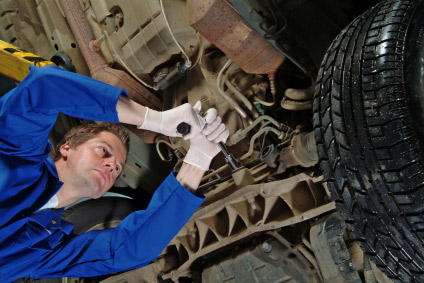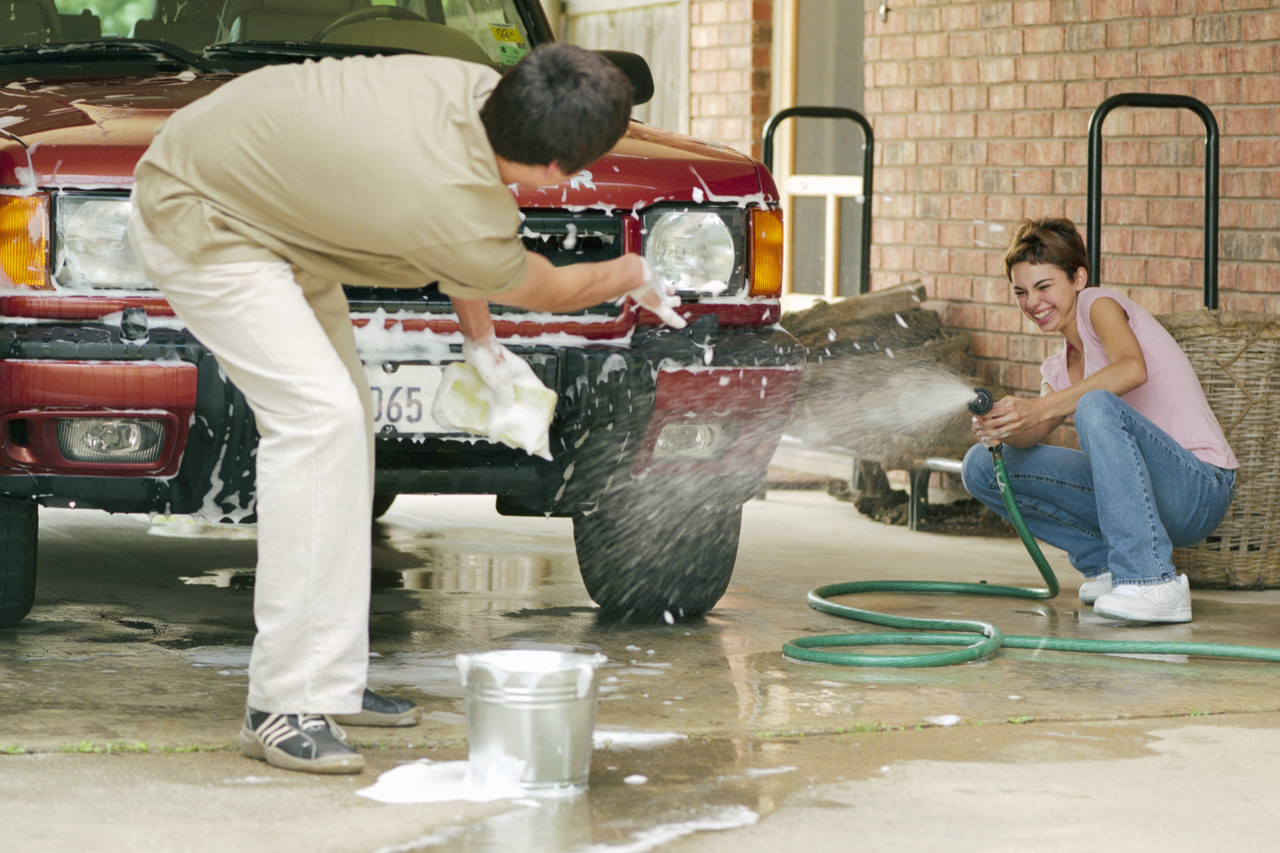 |
 |
 It
has happened to many of us. You go to start your car and you are met
with the gut-wrenching sound of the key turning, and nothing more. Or
worse - in the middle of downtown rush hour traffic your automobile
dies, and won't restart. The culprit? It might be your timing belt. It
has happened to many of us. You go to start your car and you are met
with the gut-wrenching sound of the key turning, and nothing more. Or
worse - in the middle of downtown rush hour traffic your automobile
dies, and won't restart. The culprit? It might be your timing belt.
Certain
engines with overhead camshafts utilize timing belts - which have a
notoriously limited life span. Car makers use these belts in lieu of
longer lasting chains to reduce manufacturing costs and noise-level.
Often times, this difficult-to-check but necessary engine part fails
without warning.
Your
protection? Change your belt at the recommended intervals, to prevent
the scenarios of being stranded. Timing Belt replacement might seem
costly, however, it is essential to the longevity of the engine and the
vehicle - and not replacing it can be far costlier if damage is caused.
Depending
on your type of engine, interference or non-interference engine, the
malfunction of the timing belt can cause the engine piston to crash
into an open valve, bending and breaking pistons and valves - which
causes serious engine damage. Even if this is not the case, nobody
likes to add being stranded and the costs of a tow truck into the mix.
You
might also have your water pump replaced while replacing your timing
belt. Technicians recommend this, as the water pump should be replaced
at roughly the same frequency, and the labor process is very similar -
potentially reducing overall labor costs. While some water pumps may
last the lifespan of the vehicle, many fail, costing you more money
down the line.
Maintaining these critical components is vital
to ensuring a long lifespan of the car. Speak to your automotive
technician about your vehicle's needs, and be sure to bring your car in
for its scheduled maintenance.
|
|
 |
 |
 There's
a few things you can do to make your car washing a little less harsh on
the environment and water resources. Here's some tips: There's
a few things you can do to make your car washing a little less harsh on
the environment and water resources. Here's some tips:
Wash your car on the grass.
This
will give the grass a drink, the soil will help to break down
impurities and prevent the water from entering stormwater drains and
winding up in local waterways. Some of the chemicals in car wash
detergents are nutrients for algae; so this water getting into
waterways can add to algael bloom and eutrophication problems.
Be hose wise.
The
only time you should have the hose on is when rinsing. Also use an
adjustable trigger nozzle to improve pressure while reducing water
consumptions.
Detergent.
Use an earth
friendly detergent or consider not using any at all if possible. If you
do use detergent, don't use in excess of manufacturer's
recommendations; you'll only waste money, put more chemicals into your
lawn and you won't get a better result.
Use a bucket more.
The
hose should only be used for the final rinse. Sure, it's easier to sit
there and blast off grime with the hose, but it uses a ton of water. A
bit of elbow grease using a sponge and bucket is good exercise too :).
Wash in the shade.
Hot
metal evaporates water incredibly quickly. The more that evaporates,
the more you'll need to use so try and either wash your car in the
shade, wait for a cloudy day or do it early in the morning or late in
the evening.
Wash less.
Back in the day, it
wasn't unusual for guys to wash and polish their vehicles every Sunday
- it became somewhat of a tradition. If you're washing your car purely
out of habit rather than necessity, take a deep breath and try and go
cold turkey for a while. It can be done and your car won't fall apart.
Automatic car wash.
Is
an automated car wash greener? The answer is - it depends. If you pass
a car wash on your way to and from work, or during any of your regular
driving, it could be a more environmentally friendly alternative.
Modern car washes use far less water than a home wash and they recycle
their water. Automated car washes use anywhere from 20 to 45 gallons of
water, but home washing can easily use in excess of a hundred gallons.
If
getting to a car wash requires a special trip, then it's likely not a
green option when you consider the emissions of your vehicle and gas
consumption to and from the car wash.
Waterless car wash.
I've
noticed a lot of products on the market now claiming to be waterless
car washes that are also environmentally friendly. I can't say I've
ever used them, but I have read some encouraging reviews. These earth
friendly products are made primarily from vegetable extracts and
silicone. The are said to attract dirt via electrostatic means and then
coat it. It's a matter of wiping on and wiping off. I was always taught
that wiping off dirt in such a manner scratches the paint work, but if
these products do really coat dirt, I guess it wouldn't be such an
issue.
Perhaps these waterless car washing products could make a
good alternative for when your car has only light grime or could be
used every other time in order to reduce overall consumption of water.
As always, with any product claiming to be environmentally friendly,
read the label and do a spot test first.
A nice shiny car is
certainly a pleasure to behold, but given that fresh water is becoming
an increasingly scarce resource and the general environment is
rebelling against all the toxins and excess nutrients we've pumped into
it over the years, it's now time for us all to practice moderation in
all things - including washing our cars.
|
|
 |
 |
 Get a leg up on the ever-fluctuating price of gasoline and rev up your gas mileage with some very simple tune-up procedures: Get a leg up on the ever-fluctuating price of gasoline and rev up your gas mileage with some very simple tune-up procedures:
Check Tires and Alignment.
Keeping your tires inflated with the recommended air pressure and when
properly aligned will help to increase fuel efficiency up to three
percent.
Replace Filters Regularly. Oil
filters should be replaced at each oil change to keep particles that
can damage engine parts out of the system. Air filters help your engine
to burn fuel at the optimum rate – helping to increase gas mileage.
A Tuned Engine is an Efficient Engine.
Your vehicle owner’s manual outlines the regular maintenance schedule
and components that need to be checked and replaced if necessary for
optimum performance. If followed closely, these will not only provide
the best fuel mileage but also helps to ensure trouble free driving for
the life of your car or truck.
Keep Your Engine Properly Lubricated. Your
engine oil should be replaced at varying intervals according to the
manufactures recommendations found in your owner’s manual. Using the
correct grade of motor oil, also contained in your owner’s manual
ensures proper performance and reduces friction during operation that
will improve fuel economy.
Click here for more tips on increasing fuel efficiency visit the US Department of Energy Website.
|
|
 |
|
|
|
 |
|
In this Issue:
|
|
 |
|
Contact Information
|
Name
Phone
My Website
|

|
|
New Mileage Standards? Maybe Not.
|
|
On
May 19th, President Obama along with representatives of the automobile
industry and Environmental Protection Agency (EPA) officials announced
the proposal to raise the Corporate Average Fuel Economy (CAFE)
standard.
This move was applauded by environmentalists,
government, and industry as being a huge step toward energy
independence. However, the new mileage standards are just that –
standards and not mandates for better fuel economy across the board.
Each automaker is required with these standards to achieve an “average”
combined 35.5 miles per gallon (mpg) across their entire fleet. This
means, for example, that GM will still be able to offer large trucks
and SUVs getting many miles less per gallon but will have to
manufacture more fuel efficient cars and trucks to meet this average.
Currently,
there are vehicles that meet or exceed the proposed standard on the
market, or are so close to it (within 2 mpg). Once again it is up to
us, the consumer, to make educated choices – and these can be made now
– we don’t have to wait 7 years to begin saving fuel and cost.
|

|
|
Road Trip Tips
|
|
Ahhh,
the open road. As the economy continues to struggle, many Americans are
cashing in their Caribbean cruises, and European summer vacations in
for this Iconic American-style vacation. But before you pack up the car
and head out for the freedom of the open road, there are a few things
you should know.
1. Have a plan. Have some
goals in mind for what you aim to accomplish, see, or do. To make it
more fun with the family, sit down together and hash out a road trip
theme, and some destinations together. Knowing some of the fun spots
will make the kids more likely to jump in the car.
2. Route your journey. Once
you've etched out your destination, you need to plot these points along
a map. Use internet mapping programs like google maps or mapquest to
help you figure out the best routes. Keep in mind the type of travel
you are going for when you plot your maps.
3. Pack some food.
Snacks are vital to road-trips! Have 2-3 servings of snacks per person,
per day of road-trip. Some great choices: trail mix, pre-popped
popcorn, apples, bananas, oranges, carrots and celery, raisins, graham
crackers, and yogurt.
4. Take Breaks. It's
the journey not the destination. Break every hour or two for a few
minutes. You'll be fresher on the road and ready for the many surprises
of travel, and your companions will enjoy a more relaxed pace.
5. Be prepared for an emergency. Have
a roadside emergency kit for the car and its inhabitants: flashlights,
batteries, emergency food and water, blankets, and a 2-way radio will
go a long way in an emergency. You should keep your cell phone charged
and have the phone number for your insurance and roadside assistance
companies easily accessible.
6. Get your car tuned-up first!
Having your oil change, tires rotated and filled, and your fluids
topped off is essential before embarking on a journey. Talk to your
mechanic about how far you will be driving, and accomplish any
necessary vehicle maintenance before embarkation.
Regardless
of your destination, taking the family for a week of cruising, music,
games, and laughter will help to reconnect your family and give you a
much needed vacation, without breaking the piggy bank.
|
|
 |
